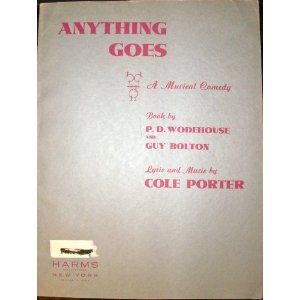
In Woody Allen’s Midnight in Paris, Gil Pender lives the dream of many a would-be litterateur and finds what we’ve all long suspected to be true: the past is close and can be escaped into for real. An open-top cab comes for him after the clock strikes twelve, and whisks him off to meet Scott Fitzgerald and Hemingway.
Pender’s a disappointment, however, goggling in the presence of the mighty like a fanboy. Perhaps that was just Paris, though: after all, Guy Bolton, P.G. Wodehouse’s old friend and collaborator on Hollywood musicals, hated the place. Which must be why Wodehouse and Bolton weren’t there with the others when Pender came calling: they were in Le Touquet writing the book for Anything Goes and waiting for Cole Porter to turn up.
Which Porter eventually did, bringing with him a sheaf of new writing, including You’re The Top and Blow Gabriel Blow. Because the Royal Picardy Hotel didn’t have a piano, or for any other reason why, Plum, Bolton and Porter made their way over to the Casino.
Did he but know it, this would have been Pender’s moment. Or anyone else of the same bent’s moment. Because with P.G. Wodehouse leaning on the piano they’d found left out in a corridor, Cole Porter began the first run-through of a string of the twentieth century’s classic songs. If you’d been born at the right age, and had had the luck and sense to wander in at that moment, you could have been there.
And someone did wander in, which is where things took an unexpected turn. Robert McCrum picks up the story:
Their meeting was interrupted by a pleasantly intoxicated young American socialite who, mistaking Porter for the casino’s entertainer, asked him to play ‘I Wonder Where My Baby Is Tonight’. When Porter laid aside the score and obliged without protest, the young man began to cry. ‘That song hits me right here… Just been divorced, so can you blame me for wondering?’
Later on that year, Wodehouse would add a couple of verses for the London run in the hope of bringing “Anything Goes†a little closer to home. It coincided with the stickiest phase of his pre-War tax troubles, and both his gloom and resentment show through.
When maiden Aunts can freely chuckle
At tales much too near the knuckle
The facts disclose
Anything Goes.
When in the House our legislators
Are calling each other “traitors”
and “So and So’s”
Anything Goes.
The world’s in a state today
Like Billingsgate today
We are each today for free speech today
Nothing’s blue today or taboo today
Or meets with scandalised ‘Ohs’
But while we hope for days more sunny
The Government gets our money
‘Cause Neville knows
Anything goes.
All that came later, and back in France, as Wodehouse recalled, the Man from Le Porloque hadn’t quite finished with them.
We made sympathetic noises, and Cole played ‘You’re the Top’. The intruder came weaving back through the door. ‘Forget that stuff,’ he said. ‘Do you know a number called “The Horse with the Lavender Eyesâ€? It drove us down from the Plaza to the church. Dawn said the horse had lavender eyes,’ he continued brokenly, ‘so we sang the song all the way down the avenue. Dawn O’Day, that was her screen name. Pretty, isn’t it? He rose and laid a small column of 100-franc chips on top of the piano. ‘What’s that for?’ we asked. ‘For him,’ he said, indicating Cole. ‘He plays okay, but he picks out rotten numbers.’
For what it’s worth, Dawn O’Day was 16 in 1934, and there isn’t a number called “The Horse with the Lavender Eyes.†There was, however, a popular tune of the time in which a horse with a lavender eye features in the lyrics. Cole Porter broke off from playing You’re The Top for the first time in history to oblige his guest with it. Here it is in its most famous rendition. See if you recognise it:
